
IWD: Francesca Pizza
In advance of International Women's Day, we spoke to Francesca Pizza from Utilitalia and chairperson of our Joint Working Group on water reuse about working in the water sector.
Since November 2011, Francesca has worked as a Process Manager at the Milano Nosedo Wastewater Treatment Plant. Before this, she was a researcher at the Department of Sustainable Chemistry of the Environment in the Institute of Novara (IT), dealing with microbiological and thermochemical processes for the production of second generation biofuels.
She holds a M. Sc. In Industrial and Environmental Biotechnology.
Francesca's main responsibilities in her day job are to monitor and support the management of the biochemical process for urban waste water treatment, to follow compliance and quality control activities, to keep up with technological improvements and support experimentation carried out at the Nosedo treatment plant in collaboration with Universities and Research Institutes.
Francesca also represents Italy in the EurEau Committee on Waste Water.
- How did you end up working in water?
Francesca: My favourite subjects at school were biology and chemistry, in particular their practical application to new environmental technologies.
I therefore chose to graduate in Industrial and Environmental Biotechnology and, since my thesis internship, I started to work on issues related to renewable materials, biofuels and organic waste recovery. From there, the transition to the waste water sector was quite direct!
What intrigued me the most about working in a WWTP is the close connection between the subjects of my university studies (microbiology, chemistry, engineering) and all the new issues about the water-food-energy nexus as well as, of course, the theme of environmental protection.
- How have things changed since you began your career?
Francesca: I have been working in the water industry for about 10 years, which is not a very long time but it is enough to see some changes and how the rapid development of new technologies has certainly allowed improvements in this sector.
Just to give you an idea, when I started working, waste water was considered a bit like the Cinderella of the whole water cycle management, especially when compared to drinking water.
Today, instead, there has been a deep change of perspective, and waste water is becoming more and more a crucial element among the new European policies that increasingly focus on energy efficiency and the green and circular economy. Just think about the recent development of the new regulation on reuse but also about the new ideas of recovering resources from WWTPs: such treatment plants are increasingly become considered as biorefineries for the future recycling of different raw materials.
All this, however, must also be accompanied by a change of mentality on the side of our governments about the water cycle management: we need to be no longer considered just as service but as real industrial and technologically advanced sector, which needs funds and resources like other productive sectors.
- How can companies/utilities encourage and retain women into this sector?
Francesca: I consider myself quite lucky, because in my path I have not come across particular situations of gender inequality, even if the engineering sector is still very masculine. I believe this is due to a generalised mentality that sees men more involved in very technical fields, even if this idea is gradually changing. Undoubtedly, however, many managerial roles still remain the prerogative of men, as if a woman, however good she may be, does not have the same management potential.
In my opinion, companies and utilities should be evaluated also for the percentage of women involved at all working levels, from the most operative to the managing rules.
- What are the main obstacles that women face in their equal participation in our sector? How can companies/utilities do this?
Francesca: Like I just said, management roles need to be opened up to women. Also, maternity (and paternity, of course) should be addressed in a more modern way. In Italy, in some cases, there is still a certain mentality that a woman who wants to create a family cannot also aim for a career… As if having children prevented you from being able to reconcile the two goals! On the contrary, this is never considered for men, but I fear it is more linked to a general cultural heritage and wrong social policies. Surely, encouraging mothers and fathers with remote working possibility, part-time, but also perhaps promoting the creation of company nurseries and playrooms, could be an excellent investment to maintain the productivity of all those who do not want to give up their work commitment while remaining excellent parents!
- Any advice for people awanting to work or wanting to improve things in the sector?
Francesca: One very simple advice: always let yourself be guided by the passion for the objectives of this work and the interest in continuous change and improvements. Our job is a real mission for the environmental protection, for us and for future generations, never abandon your curiosity and the spirit of motivation!
water, EurEau, europe, IWD, international, women's, day, francesca pizza, milano, utilitalia
- Created on .